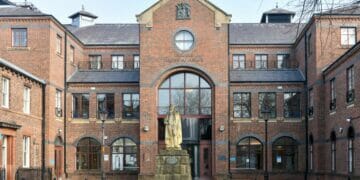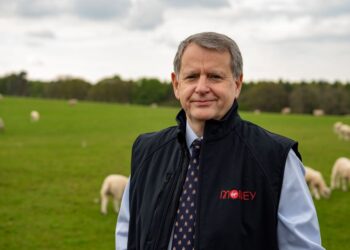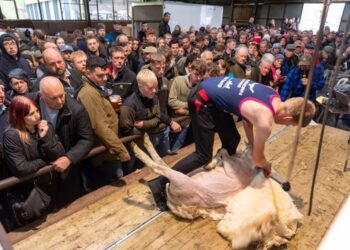
At last, in mid-March, 2001, the cavalry arrived, literally, in the form of the British army.
Led by Brigadier Birtwistle, he was a man of action, a doer rather than a talker.
Only now did we begin to see a plan evolving.
Prior to that I had come home from valuing one evening while Newsnight was on TV.
Nick Brown the Minister of Agriculture smiled and calmly reassured the nation that foot and mouth was under control.
I raged at him then broke down in tears. How could he stand there and say that when our industry was being destroyed? How did his vets know the reality, but he did not?
A while later, Prime Minister Tony Blair arrived in Cumbria to “personally take charge”.
The reaction he received from the farming community would leave him in no doubt as to how desperate the situation had become.
A huge slaughter and disposal centre was created near Wigton, where slaughter teams worked tirelessly to shoot then bury thousands upon thousands of animals in a process of industrial proportion.
The slaughter centre, the last resting place for several million animals, is now the Watchtree nature reserve.
Spring turned into summer. Outbreaks of foot and mouth were still happening across Cumbria.
The farming community locked down in a vain attempt to prevent the virus from reaching them. Farm children were home-schooled, visitors banned, vehicles such as milk tankers disinfected before entering the farm.
Sometimes kindly neighbours left food parcels at the farm gate.
A young farmer’s son near Penrith who did go to school, returned one afternoon to find the army, vets and slaughter team on farm.
The dairy cows he had left that morning after normal morning chores, were dead.
He later described to me the trauma of running from the bus to the farm in a state of shock, crying all the while.
After three months none of the Cumbrian valuers had been paid a penny by government.
The new Department of Environment, Food and Rural Affairs (DEFRA) issued a new scale of fees to replace what had first been sent. It had a sting in the tale.
There was to be a daily cap on the fees which a single valuer could earn.
DEFRA wished to backdate the new scale to the start of the crisis. It was immediately apparent that we would lose tens of thousands of pounds under the new fee scale and we argued our case.
Some days we would have reached the fee cap by 10am and kept working another 12 hours for free.
At no stage did we consider downing tools or reducing our workload. We could not let our farmers down, or the wider communities of Cumbria who were suffering in many ways too. So, we carried on.
The fee scale dispute was finally resolved some six years later.
All auction companies bar Mitchell’s had given up the fight and settled privately with DEFRA.
Our directors felt very strongly that the £58,000 that remained owing to us should be fought for. In 2007, we went to the High Court of Manchester, and with other colleagues I took to the witness box for almost two days, as principal witness for the prosecution.
Whilst on the witness stand, I was brow-beaten, attacked, lambasted, and accused by DEFRA’s barrister.
Her savage defence was that I was a clever, manipulative, and dishonest man who had quickly realised that I could defraud the government out of a substantial amount of money.
I had written a book in 2004 about my experiences during the foot and mouth crisis.
It was a diary called To Bid Them Farewell.
Every farmer mentioned in the book gave me permission to tell their tale. Not one refused. It was a book about people, experiences, and the animals.
According to the defence barrister, the book was nothing but a pack lies and untruths, all carefully manipulated by me, to line my pockets.
She sought not only to belittle the book but also the job we did.
“Oh yes” she said, “those poor farmers crying all the way to the bank”.
Only at this point did I snap and was reprimanded by the judge. “You have no idea what it was like,” I said looking straight into her eyes.
For almost two days she kept up the savagery, probing for a chink that would break me. She didn’t manage and all of a sudden “no further questions your honour” and I was stood down to spend the next three days in a complete haze.
What the heck just happened to me? Do people really believe what she was saying? Does the judge believe her?
The judge, a hard-nosed contracts lawyer, was totally unsympathetic to the human element of our defence.
He lambasted DEFRA for their handling of the situation.
He also lambasted Mitchell’s for continuing to work for DEFRA while in contractual dispute.
According to him we should have stopped valuing until the contract has been successfully renegotiated. In his eyes we were pitiful business managers.
People and animals did not come into it.
At the end of the six-day trial, the case was unresolved.
The judge told both barristers that he did not want to see the case back in court. We settled privately for around £195, 000 and no costs awarded.
After legal fees we had our £58,000. It was a moral victory if nothing else.
For months afterwards I held a private personal grudge against DEFRA’s barrister.
Then one day, I had a lightbulb moment. Of course, she was only doing her job, it was nothing personal. I felt almost relieved because throughout foot and mouth 2001, I too was only doing my job.
Foot and mouth ended officially in September 2001. All farmers had suffered, and in some ways, those who had not contracted the disease, worst of all. Life goes on. Farming families are resilient.
Our focus turned to the building of the new Lakeland Livestock Centre. Through the winter of 2001, construction continued through rain and snow. It opened its doors for the first time in May, 2002.
Brigadier Birtwistle, the man who turned the tide against foot and mouth in Cumbria, was to cut the ribbon at the official opening.
Despite the many operational restrictions imposed on all marts following foot and mouth, that first sale was a ray of hope after many months of bleakness.
In fact, a close farmer friend of mine who had not left his farm near Millom in over a year, was at ringside. He smiled through his tears and said: “It feels like someone has switched the sun back on.”
Even though the painful memories of foot and mouth will always be there, my friend spoke for many of us.































